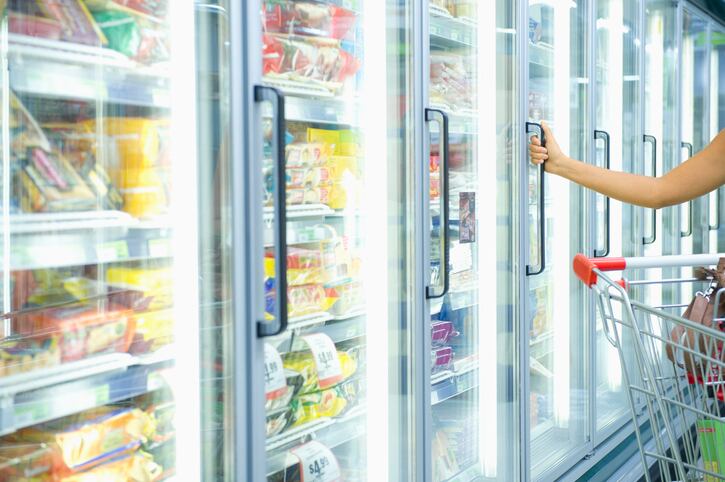Nomad Foods shares rose over 5% despite announcing a dip in sales in the second quarter as investors were encouraged that its ‘value creation model’ will help sustain long-term growth.
The European frozen food specialist, which counts household names like Birds Eye, Findus and Iglo among its stable, had been riding high as consumers flocked to the freezer aisles during COVID restrictions. The company confidently predicted that this trend would continue post-pandemic.
But its second-quarter results revealed a 4.5% drop in organic revenues – a lower dip than analysts had predicted – as consumer demand fell amid an easing of lockdown restrictions. Investor confidence, however, was boosted by the company’s gross margin – the percentage of a company's revenue that it keeps after subtracting direct expenses such as labour and materials. This rose by more than analysts had expected, and the company said it remains on pace to achieve its guidance for the year.
“We achieved strong results during the second quarter notwithstanding easing of restrictions across Europe and the anniversary of peak COVID-related demand,” said Stéfan Descheemaeker, Nomad Foods’ chief executive officer, who noted the second quarter 2021 results marked the highest second-quarter adjusted EPS in the company's history despite the most difficult comparison of the year. “The power and resilience of our value creation model was evident during the quarter as contribution from M&A, share repurchases and margin expansion more than offset an expected organic revenue decline,” he said.
Nomad’s ‘value creation model’ is based on a dual-pronged strategy to grow organically and through M&A. Earlier this year it completed its acquisition of Findus Switzerland to cement its position as Europe’s leading frozen food company. It has also snapped up Croatia’s Fortenova’s frozen food business, a deal that’s expected to close at the end of the third quarter.
Growth in the frozen food category, added Descheemaeker, remained elevated on a two-year basis but ‘did normalize versus the first quarter when most of Europe was under lockdown’. “Against this backdrop, we experienced sequentially improving market share trends during the second quarter with market share in May and June, both increasing versus the prior-year period.”
The company has successfully navigated a dynamic inflationary backdrop, he added, and has also experienced foodservice growth of over 40%. “With more than half of the year behind us, we remain confident in achieving our 2021 guidance,” he stated.
Noam Gottesman, Nomad Foods’ co-chairman and founder, added the group had “exciting growth opportunities, both organically and inorganically” ahead.
It company expects to continue benefiting from changing food preferences. Meat-free range Green Cuisine continues to be a ‘key driver of both absolute growth and share gains as we build distribution, grow penetration and drive across our European footprint, according to Descheemaeker. “In two short years, Green Cuisine has become one of the leading brands within Europe and now has nearly 14% share of the frozen category across Western Europe,” he said. “Consumers love our products, and we continue to believe we have every right to win in this exciting white space growth opportunity… We are building Green Cuisine into one of the largest and fastest-growing plant protein brands in Europe, attracting new consumers into our portfolio, driving innovation within the frozen food.”
Deutsche Bank’s equity analysts called Nomad’s long-term growth opportunities ‘compelling’. “Market share gains from increased promotional activity should enable Nomad to sustain top-line momentum in next year, further supplemented by contributions from Fortenova and a growing international business,” they wrote and “should help sustain growth even as at-home category consumption in core markets continues to normalize”.
The team of equity analysts at UBS added: “We are encouraged by Nomad's 2Q results and remain constructive on the long-term outlook.”
The end of peak-COVID-related demand?
A separate report in the UK from IGD said ‘shopping around’ for food and grocery items has increased among consumers and is now higher than pre-pandemic levels, following the further lifting of restrictions.
According to its ShopperVista database, the number of food and grocery shops used by shoppers has risen to 13, which is the highest level since December 2018.
The shift in shopping culture has been seen most in hypermarkets and supermarkets in the last month and is likely to be driven by a combination of the lifting of Covid-19 restrictions, the heatwave conditions and the Euro 2020 finals, it noted.
Meanwhile, shopper confidence continues to remain relatively strong according to the latest Shopper Confidence Index. At -3, it mirrors last month’s level and is one of the highest levels in the last five years. But this is coupled with several challenges such as the persistent K-shaped economic recovery which creates increased polarisation between lower and higher income households, and rising inflation.
Simon Wainwright, Director of Global Insight at IGD, explained: “During the pandemic and consequent lockdowns, retailers have been able to capitalise on relatively captive audiences. Now, as restrictions lift, shoppers have the freedom to shop around for favourite products, quality and variety. The increase to pre-pandemic levels may be a result of shoppers making up for lost time, boosted by feel-good events, such as the Euro Finals.
“However, this motivation is only likely to be true of more affluent shoppers. Lower income households are more likely to be shopping around for value amid rising concerns around price inflation.
“Retailers will need to concentrate on driving loyalty to maintain market share, by focusing on range, quality and innovation. There will be a real spotlight on value as inflation rises, particularly for lower income households.”



